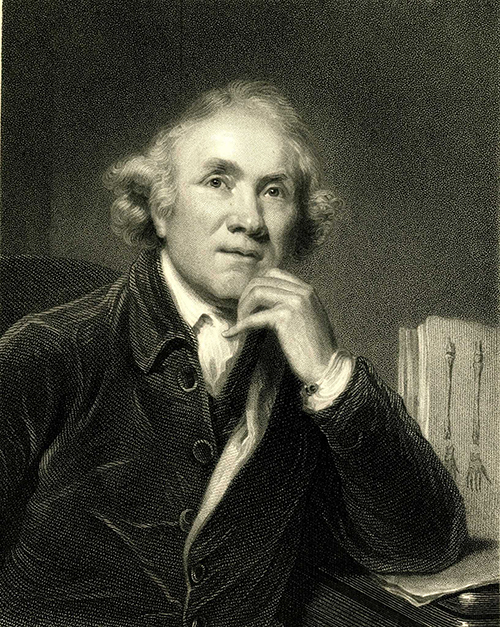The natural history of the human teeth: explaining their structure, use, formation, growth, and diseases. 2nd edition. London: printed for J. Johnson, 1778.
A treatise on the blood, inflammation, and gun-shot wounds. London: John Richardson for George Nicol, 1794.
 In 1748, the fairly uneducated and uncultured twenty year old John Hunter came to London from Scotland to study dissection at the school of anatomy ran by his brother, William Hunter. After only a year, he was already teaching anatomy and learning surgery from the experts of the day. Later he was an army surgeon in the British expedition to Belle Ile during the Seven Year’s War. Knowledge acquired from this first-hand experience with gunshot wounds eventually showed up in his famous A treatise on the blood, inflammation, and gun-shot wounds (1794), an original edition of which is owned by the Reynolds-Finley Library. This work includes one of the initial studies on the pathology of inflammation. Also, he proposes the removal of mortified tissue from wounds and reductions in blood loss to enable faster healing (One Hund. Books 52).
In 1748, the fairly uneducated and uncultured twenty year old John Hunter came to London from Scotland to study dissection at the school of anatomy ran by his brother, William Hunter. After only a year, he was already teaching anatomy and learning surgery from the experts of the day. Later he was an army surgeon in the British expedition to Belle Ile during the Seven Year’s War. Knowledge acquired from this first-hand experience with gunshot wounds eventually showed up in his famous A treatise on the blood, inflammation, and gun-shot wounds (1794), an original edition of which is owned by the Reynolds-Finley Library. This work includes one of the initial studies on the pathology of inflammation. Also, he proposes the removal of mortified tissue from wounds and reductions in blood loss to enable faster healing (One Hund. Books 52).
Upon his return from service, Hunter settled in London and became a hard-working surgeon, teacher, collector of specimens and researcher of anatomy and pathology. He was dedicated to science, even sacrificing his own health by inflicting himself with venereal disease so that he could observe its character. He was an interested and involved instructor, being available for discussion long after class, giving lectures and hosting student society meetings at his house, and supporting a list of well-known pupils (Dict. Sci. Bio, Vol. 5-6, 567). His vast collection of anatomical and biological specimens was put on display in an educational museum. After his death, the collection became the famous Hunterian Museum of the Royal College of Surgeons, a portion of which still remains despite damage from a 1941 bombing. His classifications of teeth are still used in dentistry today and his studies remain fundamental to dentistry. By combining surgery with experimental research in physiology and pathology, he was responsible for raising it from the status of an art to that of a science (Garrison 344-345). Indeed, through Hunter’s influence the barber surgeon’s trade was transformed into a profession.
Hunter is the first to study teeth scientifically, introducing classifications, such as the cuspids, bicuspids, molars and incisors. The work that presents these classes is The natural history of the human teeth, originally published in 1771. Here, he also tracks tooth development from birth and addresses tooth structure and composition. He proposes a form of transplantation and a device for treating malocclusion. The Reynolds-Finley Library holds the second edition of this work from 1778, which includes a supplement, entitled A practical treatise on the diseases of the teeth. Here, Hunter develops observations about diseases of the mouth, abscesses, nerve pains in the jaw and tooth decay (Not. Med. Books 131).
Dict. Sci. Bio, Vol. 5-6, p. 567; Garrison, Hist. of Med., 4th Edition, pp. 344-348; Garrison & Morton, Med. Bib., 5thEdition, 78, 2283, 3675, 3676; Heirs of Hippocrates, 609, 612, & 613; Not. Med. Books, p. 131; One Hund. Books,52; Reynolds Historical Library, Rare books and coll…, 4824 & 2120.
Image: John Hunter, Print Collection, Reynolds-Finley Historical Library.
